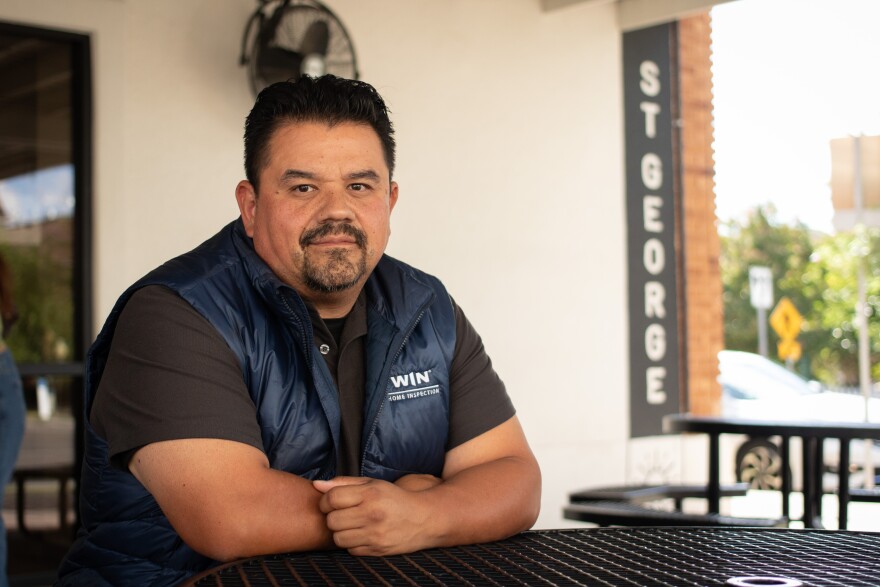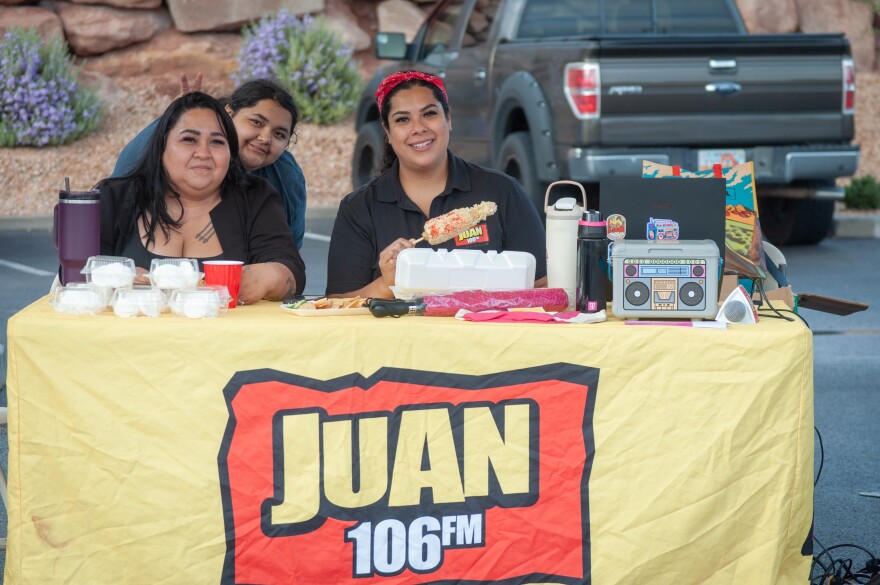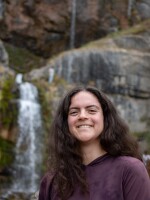Pueden encontrar la versión en español aquí.
—
Suleyma Plancarte came in through the back door just after six on a Friday morning. She hustled past a small kitchenette and into her radio studio at Canyon Media in St. George, setting her bags and breakfast down on the desk.
Gray sound panels covered the walls, dotted with radio station flyers and cards from local businesses. Two microphones faced away from Plancarte for guests. A pair of colorful maracas perched next to one of her computer monitors.
This is where she broadcasts Las Mañanas con Suleyma — Mornings with Suleyma — the only local show on St. George’s Juan 106FM. Every weekday morning, she breaks up national music programming and tailors her show to southwest Utah with songs, local interviews and audience interaction.
A few minutes after settling in, she hit the mic button and went live.
“Buenos días, amigos de Juan 106FM, tocando lo que le gusta!”
“Good morning, friends of Juan 106FM, playing what you like!” she called out enthusiastically. “It is Friday!”
The question of the day was lighthearted: What would you do if you woke up one day and could fly? She told listeners she would soar all over Snow Canyon State Park.
Off-air, she queued up music, shared the question on social media, and then set up her TikTok livestream.
Some people tune to the radio show while sharing a bus between St. George and their jobs outside Zion National Park, she said. Construction workers might turn it on while they work, or parents as they drive their kids to school.
Desai Madrigal listens while driving between home inspections. Originally from Mexico, he moved to nearby Washington City from Salt Lake County during the pandemic.
Plancarte is a genuine person who wants to make a difference, he said. He likes hearing Spanish music and the information Plancarte shares for locals, like when injury lawyers come on the show and talk about insurance.
“I know a lot of these guys are advertisers and stuff, but still, it's information that we need, right? It's like, ‘What happens if I get in an accident? Who do I call? Where do I go?’”
About 12% of Washington County residents are Hispanic or Latino. It’s the fastest-growing share of the population, up from less than 2% in 1990. That growth has led to more Hispanic-owned businesses, including restaurants, Madrigal said. He started the Southern Utah Latino Business Alliance last year to serve local entrepreneurs.
Other services have come and gone, like the advocacy group Hispanos Unidos and a bilingual St. George newspaper called “La Voz Latina de Utah,” or “The Latino Voice of Utah.”
Madrigal said there just aren’t many organizations dedicated to Hispanic and Latino residents in southwest Utah, from social services to casual hangouts. Despite over 20,000 Hispanic or Latino residents calling Washington County home, he doesn’t feel like it’s a tight-knit community.
“Latinos love food, and we love dancing and we love, you know, all that type of stuff, nightlife,” he said. “There's not a lot of places like that, just to say, ‘Let's go do this or that this weekend.’”

Plancarte’s show can have that playful, community-building feel — as with the flying question. But sometimes it’s more serious, with a domestic violence therapist or a paralegal as a guest.
Plancarte was born in the United States, but her Mexican immigrant parents told her not to talk about their family’s status. That made it hard to connect with classmates in school.
And as the oldest sibling growing up in St. George, she didn’t have anyone to turn to when things got hard.
“I want to be that person that somebody needed,” she said. “You know, I needed somebody.”
Recently, a listener thanked her for talking about mother-daughter relationships.
“She was like, ‘Hey, thanks to this topic that you had, I asked my mom something about my childhood, and why she did this, and we had never talked about it. So she opened up, and it just, like, cleared so many things, and caused so much relief.’”
Even the advertisements are part of Plancarte’s mission to inform the community. She vets local businesses to make sure they’re trustworthy places for her listeners to do their taxes, buy a house or go for medical help. Since she grew up here, it’s not unusual for advertisers to be people she knows from her school days.
“And when I say ‘Who can they trust?’ it’s because we don't get treated the same everywhere that we go,” she said.
For Plancarte, hosting a radio show wasn’t a lifelong dream. She learned to be a hair stylist and makeup artist and worked in restaurants. But health issues drove her to find something less physical. She found a video of Juan 106FM on social media and reached out to the station for advice on how to find a similar career. She wound up with a job offer.
In her first couple of years on the air, she picked up Spanish vocabulary she’d never used at home and became more comfortable as a host.
The company’s seven local stations all strive to build community and help listeners understand each other, said Ben Lindquist, general manager of Canyon Media. He said Plancarte has come a long way in that mission.
“She's gone to great lengths to be very, to try and connect the Latino community and the existing, kind of southern Utah community,” he said.
If it had been around, the show would’ve helped her family when she was growing up, Plancarte said.
“It would have helped us feel more comfortable in public, at school, at our jobs.”

Beyond the radio, she plans and promotes local events, like a biweekly Latino market with music and small vendors. There’s also the Juan Fest, which will take the form of a Christmas festival this December, since Plancarte was on maternity leave during the planning months for its usual October date. These gatherings help fill a gap she noticed in her youth, when she didn’t see any Latino events and craved more connection with her culture.
Now, she said, there’s a new generation that doesn’t have to miss out. They can find role models and enjoy spaces that are different from other ones in town.
“They get to see so many people selling food and selling products and speaking the language and talking to each other,” she said.
And Plancarte said she’s grateful for that.
Macy Lipkin is a Report for America corps member who reports for KUER in northern Utah.






